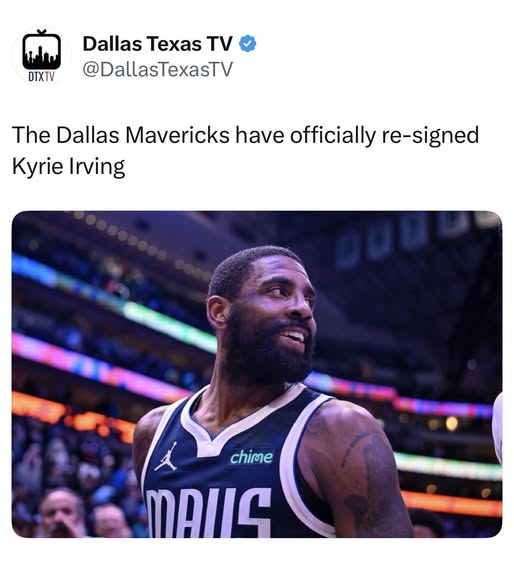The Dallas Mavericks have made a bold move by re-signing Kyrie Irving to a three-year, $119 million contract, ensuring the superstar guard remains a cornerstone of their franchise for the foreseeable future. However, the excitement surrounding this deal is tempered by the sobering news that Irving is expected to miss a significant portion of the upcoming season due to a torn ACL. This development leaves the Mavericks in a precarious position as they navigate the challenges of competing in a loaded Western Conference without one of their best players for an extended period.
Kyrie Irving’s tenure with the Mavericks has been a rollercoaster since his arrival via trade in the 2022-23 season. Known for his unparalleled ball-handling, scoring prowess, and clutch performances, Irving has been a dynamic force when healthy. Yet, injuries and off-court controversies have often overshadowed his undeniable talent. The torn ACL is just the latest setback in a career that has seen its fair share of obstacles. For the Mavericks, re-signing Irving was a calculated risk—one that acknowledges his elite skill set while also accepting the inherent volatility that comes with him.
The financial commitment to Irving is substantial, averaging nearly $40 million per season. In today’s NBA, where elite guards command max contracts, this deal is in line with market value for a player of Irving’s caliber. However, the timing of his injury raises questions about the Mavericks’ immediate future. With Luka Dončić entering the prime of his career, the team cannot afford to waste another season waiting for reinforcements. The front office must now pivot quickly to ensure they remain competitive in Irving’s absence.
One of the biggest challenges will be replacing Irving’s production on the court. Last season, he averaged 27 points, six assists, and five rebounds per game while shooting an efficient 49% from the field and 39% from three-point range. His ability to create his own shot and take pressure off Dončić was invaluable, particularly in late-game situations. Without him, the Mavericks will need other players to step up. Spencer Dinwiddie, who was reacquired in a previous trade, will likely assume a larger role in the backcourt. His playmaking and scoring ability make him a solid stopgap, but he lacks Irving’s star power and ability to dominate games.
The Mavericks may also look to free agency or the trade market to add another guard. Players like Dennis Schröder or even a reunion with Jalen Brunson—though highly unlikely—could be explored. Alternatively, they might prioritize wing depth to bolster their defense and three-point shooting. The loss of Irving means Dončić will have to carry an even heavier load, which could lead to fatigue or increased injury risk over the course of the season. Managing his minutes and ensuring he has adequate support will be critical for head coach Jason Kidd.
Beyond the immediate roster implications, Irving’s injury raises long-term concerns. ACL tears are serious injuries, and while modern medicine has improved recovery timelines, there’s no guarantee Irving will return to his pre-injury form. At 31 years old, he’s no longer a young player, and his reliance on quickness and agility makes this injury particularly worrisome. The Mavericks are betting on his ability to rehab effectively and return as the same explosive scorer, but history has shown that some players never fully regain their peak athleticism after such injuries.
The psychological impact on the team cannot be overlooked either. Irving’s absence will test the Mavericks’ resilience and chemistry. Last season, the team struggled with consistency, often looking disjointed even when both Dončić and Irving were healthy. Now, with one of their leaders sidelined, the remaining players must rally together to keep playoff hopes alive. Veterans like Tim Hardaway Jr. and Maxi Kleber will need to provide stability, while younger players such as Josh Green and Jaden Hardy must take leaps in their development.
From a strategic standpoint, the Mavericks may need to adjust their playing style. With Irving out, they’ll likely rely more on Dončić as the primary ball-handler, which could mean slower-paced, isolation-heavy offense. While Dončić is more than capable of carrying the load, the team’s lack of secondary creators could make them predictable. Kidd may need to implement more motion-based sets to keep defenses honest and generate easier looks for role players. Defensively, the Mavericks were already a middling team, and Irving’s absence won’t help. They’ll need to tighten up on that end to stay competitive in close games.
The Western Conference is as stacked as ever, with teams like the Denver Nuggets, Phoenix Suns, and Los Angeles Lakers making significant upgrades. The Mavericks, even with a healthy Irving, would have faced an uphill battle to secure a top-four seed. Now, without him for much of the season, they may find themselves fighting just to make the playoffs. The play-in tournament could become a realistic scenario, which would be a disappointment for a team with championship aspirations.
Looking ahead, the Mavericks’ front office must weigh their options carefully. If the season starts poorly, they could pivot toward developing younger players and preserving draft capital. Alternatively, they might explore trades to acquire another star, though their assets are somewhat limited after the Irving trade. The pressure is on general manager Nico Harrison to make the right moves, as Dončić’s patience won’t last forever. The Slovenian superstar has already voiced his desire to compete for titles, and if the Mavericks can’t build a contender around him, other franchises will surely come calling.
In the grand scheme, re-signing Irving was a necessary gamble. When healthy, he’s one of the most electrifying players in the league and a perfect complement to Dončić. But the injury casts a shadow over what should have been a celebratory offseason. The Mavericks now face a season of uncertainty, where their ability to adapt will determine whether they sink or swim. For Kyrie Irving, the road to recovery will be grueling, but if anyone can defy the odds, it’s him. His career has been defined by moments of brilliance and adversity in equal measure, and this latest chapter will test his resilience like never before.
For Mavericks fans, the hope is that this setback is only temporary. The vision of a Dončić-Irving duo leading Dallas to a championship remains alive, even if it’s delayed. In the meantime, the team must find a way to stay afloat in a brutal conference, proving that they’re more than just a one-man show. The 2023-24 season may not go as planned, but with smart adjustments and a little luck, the Mavericks can still make it a year to remember.



